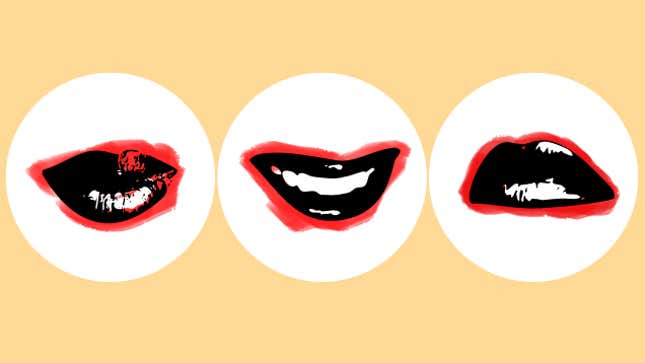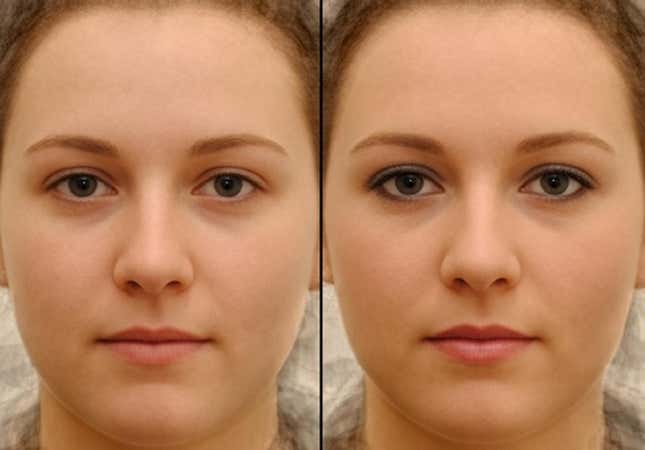Here's Why You're Wearing More Makeup Than Everyone Thinks You Need To
Latest

When you leave home ready to face the public having spent five minutes or 50, you have artfully negotiated a far more complex arrangement than can be summed up in a study about how much makeup is the most attractive according to men, women, pets, postal workers, goldfish, or Bangor University students. Nonetheless, such a recent study says you’re slathering it on way thicker than you need to because you don’t know any better.
From The Atlantic, in a piece called “Women Wear Too Much Makeup Because They Mistakenly Think Men Like It,” we learn that women don’t realize they could wear way less makeup and actually look better:
Researchers Alex Jones at Bangor University and Robin Kramer at Aberdeen University in the U.K. photographed 44 early-20s white women, all of whom had just washed their faces, with a Nikon D3000 SLR camera in a naturally lit room. Then they gave them “a range of best-selling foundations, lipsticks, mascaras and blushers,” and told them to apply the products as though they were getting ready for a night out.
The women did so.
The researchers took their photos again.

They fiddled with each model’s pics and arranged them from makeup-free to clearly made-up, then asked 44 students at Bangor U — in a “tiny hamlet in Wales” — to choose what they liked best, what they thought women liked best, and what they thought men liked best.
The results:
The female participants thought the models looked better with slightly more makeup than the male participants did. However, all of the participants thought male observers would want the models to be wearing more makeup than female observers would.
They were wrong—men and women preferred the same amount. And that amount was less than the models had actually applied.
Say the authors of the study:
“Taken together, these results suggest that women are likely wearing cosmetics to appeal to the mistaken preferences of others,” Jones and Kramer wrote in the study, forthcoming from the Quarterly Journal of Experimental Psychology. “These mistaken preferences seem more tied to the perceived expectancies of men, and, to a lesser degree, of women.”
In other words, the models were primping for nonexistent ideals, not for actual humans.
The Atlantic writer concludes that it’s comforting to learn that we’re the only people who think we should look flawless.
But to me, choosing what’s “more attractive” in this scenario is pretty useless — so what if, say, theoretically, we learn that red hair is actually the most pleasing thing around to all species on earth? Sure, some people might dye their hair red for this reason alone, but I’d bet that most women will only do so if they think red hair looks good on them and like it.
But even taken seriously, the study doesn’t seem to address or care about the myriad reasons we put stuff on our faces in the first place, reasons that go well beyond simple attractiveness to strangers, and are as complex and full of positives and negatives as the foundation we’re spackling on — such as:
It’s Nighttime: Asking women to get made up for nighttime, as the study did, often means putting on more makeup. Duh: Most people go to dark places at night — dark bars, low-lit restaurants, pitch-black clubs, where they expect to be seen in less light. Point being, you’d naturally play up features even more in that setting than you would for a daytime excursion.
You’re Winging It: The study gives participants the practically omniscient advantage of choosing from three versions of a woman’s made-up face — bare, light makeup, or heavy makeup. If getting ready for actual women were as simple as pulling a Cher in Clueless and Polaroiding every possible look first in advance, sure, we all might choose less blush. But most of us have only a mirror and our own accumulated idea of what “looks best” to guide us at 7:30 in the a.m., not input from What Not to Wear or a panel of “impartial” university students.
Looking Good to Strangers Ain’t the Point: Sometimes it’s to pull off a look we like, sometimes it’s about how we feel that day, sometimes it’s about comfort, sometimes it’s about preference, blah blah blah. Whether it’s too look healthy, like you take care of yourself, or to merely show you made minimal effort to show in public (what that means to you), to reduce all that complex effort to “looks attractive or not to others” is an absurd oversimplification of the point of cosmetics in the first place.
It’s What WE Like: Again, a huge part of makeup is about putting together a personally acceptable look that expresses our individuality — that’s why some women love a bold lipstick, even if they might “technically” be more appealing to “most” people wearing a “neutral.” It’s called a personality. If it’s only about max-attractiveness, than practically everyone is wearing the wrong glasses, jeans, and shoes as far as I’m concerned.
It’s About the Relentless Avalanche of Flawless Women in Ads: And yes, the constant exposure to flawless images has created a new baseline — the sense that bare minimum, concealer is critical to looking acceptable, whether at work, where you can be penalized for not wearing enough makeup, or just in life, where the effort of other, also-exposed women in your group normalizes the level of made-up-ness you operate at. “Natural” is now the sartorial equivalent of “literally”: No makeup used to mean no makeup, now it pretty much means you’re wearing everything you could put on your face except for black eyeshadow.
It’s An Evolving Thing: But the amount of makeup a woman wears is also something honed over a lifetime that’s subject to change. What you do when you’re a teenager playing dress-up is totally different from what you do as a young woman with her first paycheck or some disposable income, or an older woman managing a totally different canvas. It’s also about socioeconomics — the access you have to cosmetics, the quality, or the training and skill to apply makeup well. It’s about what other women you grew up with did, and how you feel about your own appearance. It’s about whether you’re covering up acne or other various “blemishes.” It’s about your comfort level. It’s about how much you enjoy makeup as theater or put it on merely because you feel you have to. It’s about where you’re going that morning, or that day, or that evening, and who you expect to see.
It’s About Sex: Yes, of course, somewhere in there it’s definitely about whomever we wish to attract, but not first and foremost, and certainly not only.
It may be interesting on some level that we all think more makeup is necessary than what we might choose given the choice between more or less, but it has little bearing on reality.
If, for instance, you showed participants only a selection of all models in the most made-up face mode and asked everyone to pick the most attractive, they’d all still pick someone — it’s not as if the participants would refuse to pick anyone on the grounds of being too made up. So what would that tell us? What you choose in a vacuum is entirely different than what you choose in a lineup. I think we already know that, so why don’t more researchers?
Image by Jim Cooke.